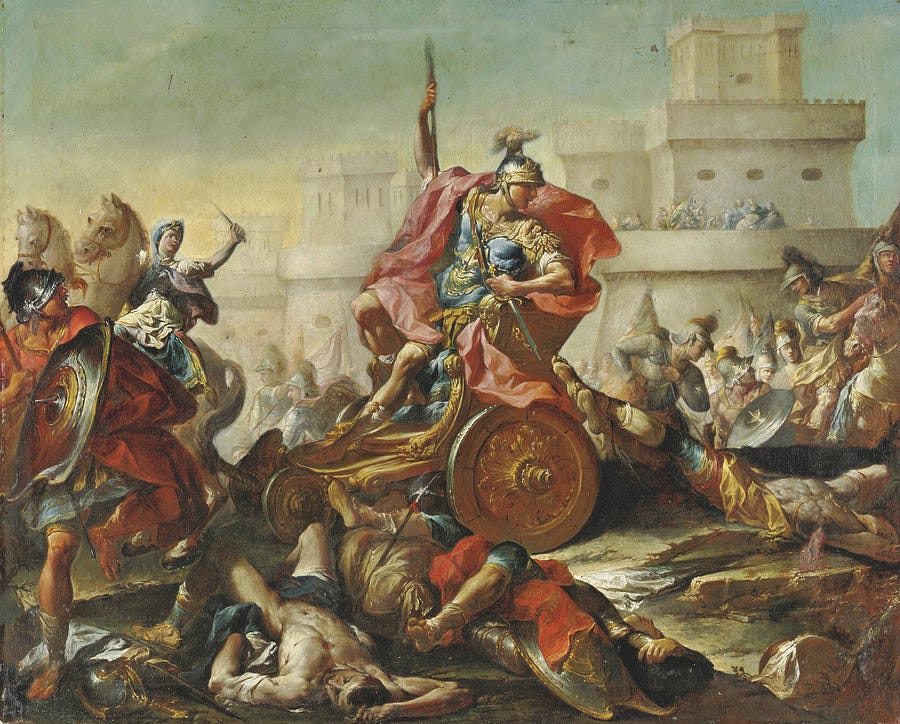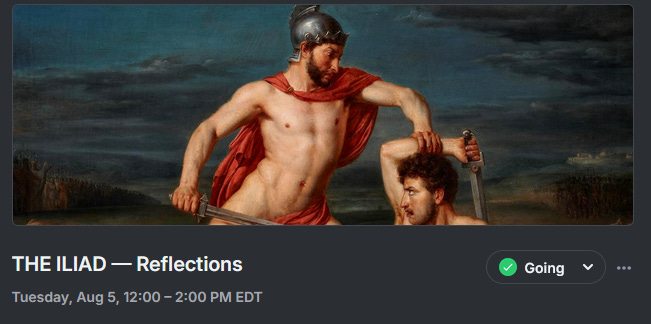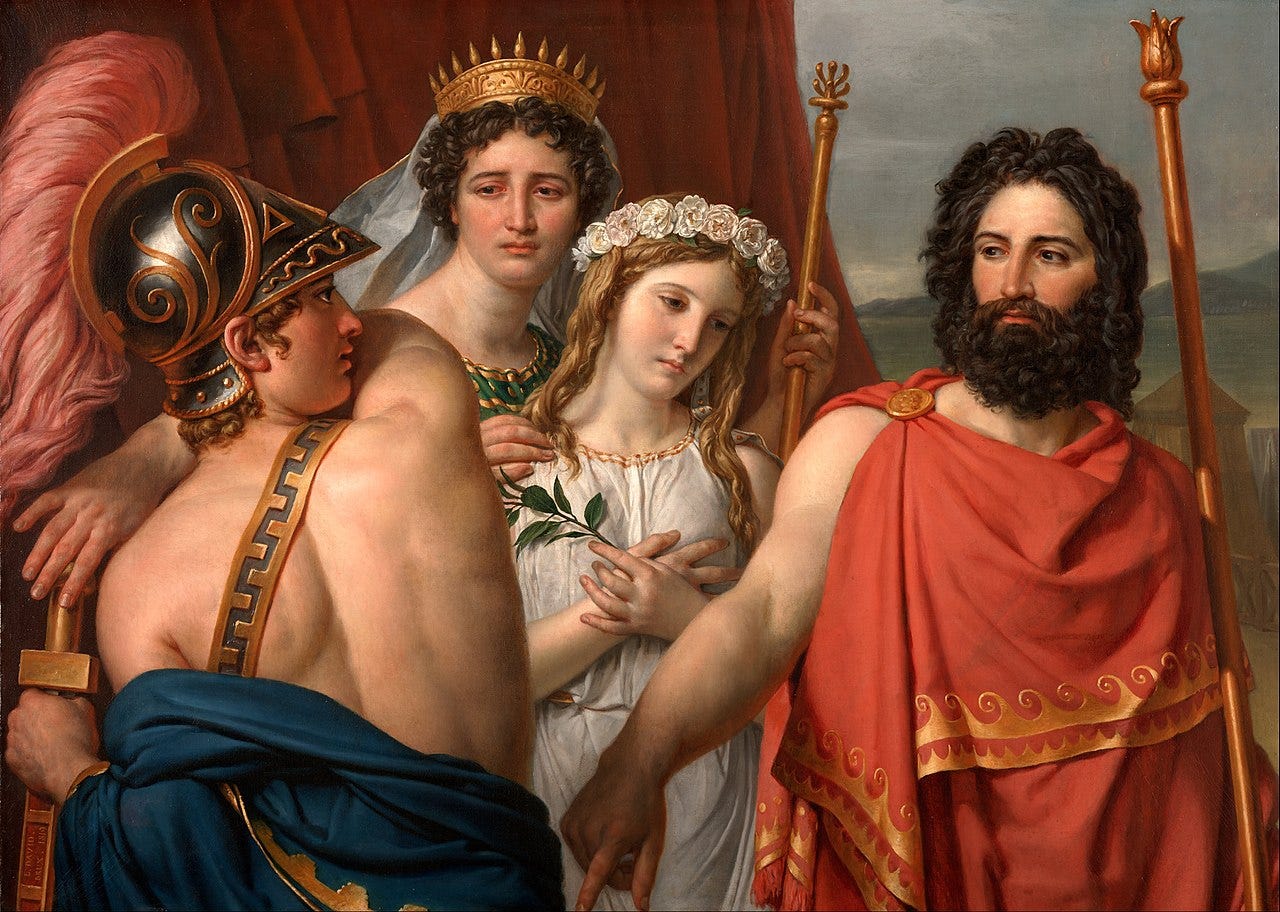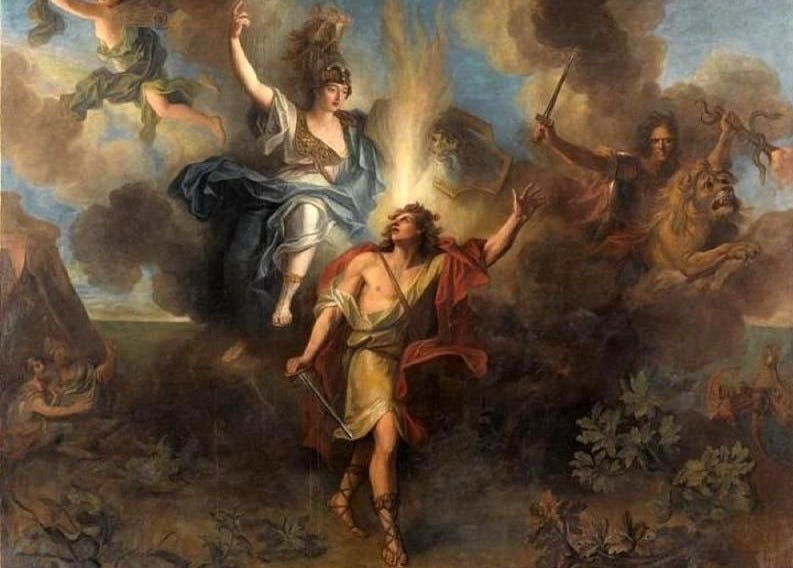The Iliad's Unexpected Lesson
And when to show mercy...
Achilles’ wrath roars through Homer’s Iliad from the opening lines. Throughout the story, it festers and looms over the narrative before finally boiling over in book 20, when Achilles storms the battlefield.
What follows is bloody murder and carnage that’s haunted literary imagination to this very day.
Yet Achilles’ greatest scene has nothing to do with the slaughter. He’s famous for his rage, but it’s what happens after the violence that marks the most profound moment in the entire narrative of the Iliad.
What happens exactly?
Achilles receives a visit from none other than a sworn enemy, who beseeches the warlord with a humble request. The request is so profound that it not only simmers the demigod’s wrath, but actually moves Achilles to tears of pity. His breakdown shed light on a moral truth of human nature that has taught us the meaning of man’s soul to this very day.
Here’s the request that healed a demigod’s wrath, and what the perennial truth it reveals about human nature in the midst of tragedy and war…
Don’t forget to join our FREE book club!
We started a digital book club to study the great texts of Western Civilization — from Dante to Dostoevsky — together. Inside, you’ll get:
Live community book discussions (bi-weekly)
New, deep-dive literature essays every week
The entire archive of book reviews + our 100 great texts reading list
We’re diving back into The Iliad tomorrow, August 5th at 12 PM EDT — hope to see you there.
Sign up below to attend — all paid members can join the live discussion up on stage…
Note: paid subscribers via Substack will automatically receive an access link for the live calls (check your inbox).
Godlike Achilles
As a reminder, Achilles’ wrath was invoked by his own king — Agamemnon.
The Greek leader publicly stole Achilles’ concubine, Briseis, which was a great dishonor to Achilles and his glory. Given that Achilles was famously prophesied to die young, in exchange for immortal glory, you can understand his violent reaction — this dishonor (at least in Achilles’ eyes) threatened his entire legacy.
As such, Achilles quit the war and prayed that the Trojans would slaughter the Greeks. He wanted Agamemnon to beg for Achilles’ help in broken humility… yet it won’t be Agamemnon who incurs Achilles’ ultimate wrath. Someone else will take Agamemnon’s place — Hector, leader of the Trojans. He kills Patroclus, Achilles’ best friend, on the battlefield. Tragically, this act spelled doom for not just Hector, but the entire Trojan cause.
Storming the Fields
After Patroclus’ death, Achilles is described as having a “godlike,” rage. This comparison to the gods is not because Achilles is virtuous, but because he’s bestial — he’s lost all rationality and mirrors the destructive chaos that the olympian gods represent.
He takes to the battlefield and slaughters Trojans mercilessly. Everyone in his path perishes, and he even clogs a nearby river with corpses.
The most chilling moment in the text is when he captures a Trojan soldier, Lycaon. The soldier surrenders, drops his weapons, falls to all fours, and hugs Achilles’ knees, begging for mercy.
Here’s Achilles’ response:
“Come, friend, you too must die. Why moan about it so?
Even Patroclus died, a far, far better man than you.
And look, you see how handsome and powerful I am?
The son of a great man, the mother who gave me life
A deathless goddess. But even for me, I tell you,
Death and the strong force of fate are waiting”
There is no mercy for Achilles, not even for himself. This is what godlike rage looks like — total annihilation of all living beings.
Nothing is capable of quenching his wrath, not even violence itself. Even after Achilles slays Hector, his rage carries on. He merely drags Hector’s body around the walls of Troy, hoping to mutilate it and deprive the Trojan hero of his funeral rites.
At this point, it seems both Achilles and the Trojans are doomed to destruction at the hands of his insatiable wrath. It’s as if nothing but the gods themselves can stop his vengeance.
Yet it turns out, the gods are planning to do just that. They summon King Priam — Hector’s father — to deliver a simple request to Achilles that will stop him in his tracks.
Here’s what Priam is tasked to say…







